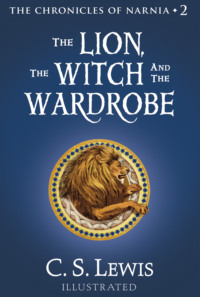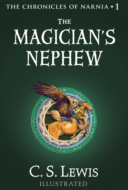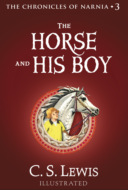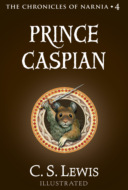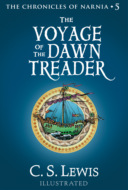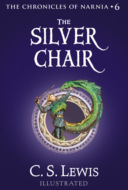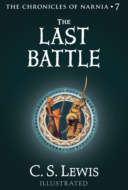Książki nie można pobrać jako pliku, ale można ją czytać w naszej aplikacji lub online na stronie.
Czytaj książkę: «The Lion, the Witch and the Wardrobe»
Illustrated by Pauline Baynes

Copyright
Although The Magician’s Nephew was written several years after C.S. Lewis first began THE CHRONICLES OF NARNIA®, he wanted it to be read as the first book in the series. HarperCollins is happy to present these books in the order in which Professor Lewis preferred.
The Chronicles of Narnia®, Narnia® and all book titles, characters and locales original to The Chronicles of Narnia are trademarks of C.S. Lewis Pte. Ltd. Use without permission is strictly prohibited.
HarperCollins Children's Books
An imprint of HarperCollinsPublishers Ltd.
1 London Bridge Street
London SE1 9GF
The Lion, the Witch and the Wardrobe
Copyright © 1950 by C. S. Lewis Pte. Ltd.
Original interior art by Pauline Baynes; copyright © 1950
C. S. Lewis Pte. Ltd.
Coloured interior art by Pauline Baynes; copyright © 1998 by C.S. Lewis Pte. Ltd.
The author and illustrator assert the moral right to be identified as the author and illustrator of this work
A catalogue record for this book is available from the British Library
All rights reserved under International and Pan-American Copyright Conventions. By payment of the required fees, you have been granted the non-exclusive, non-transferable right to access and read the text of this ebook on-screen. No part of this text may be reproduced, transmitted, down-loaded, decompiled, reverse engineered, or stored in or introduced into any information storage and retrieval system, in any form or by any means, whether electronic or mechanical, now known or hereinafter invented, without the express written permission of HarperCollins ebooks
HarperCollinsPublishers has made every reasonable effort to ensure that any picture content and written content in this ebook has been included or removed in accordance with the contractual and technological constraints in operation at the time of publication
Source ISBN: 9780006716778
Ebook Edition © MAY 2009 ISBN: 9780007325054
Version: 2018–05–23
To Lucy Barfield
MY DEAR LUCY,
I wrote this story for you, but when I began it I had not realized that girls grow quicker than books. As a result you are already too old for fairy tales, and by the time it is printed and bound you will be older still. But some day you will be old enough to start reading fairy tales again. You can then take it down from some upper shelf, dust it, and tell me what you think of it. I shall probably be too deaf to hear, and too old to understand, a word you say, but I shall still be
your affectionate Godfather,
C. S. LEWIS

THE LION, THE WITCH AND THE WARDROBE
Open the door and enter a new world.
NARNIA. . the land beyond the wardrobe door, a secret place frozen in eternal winter. . a magical country waiting to be set free.
Lucy is the first to find the secret of the wardrobe in the Professor’s mysterious old house. At first, her brothers and sister don’t believe her when she tells of her visit to the land of Narnia. But soon Edmund, then Peter and Susan step through the wardrobe themselves. In Narnia they find a country buried under the evil enchantment of the White Witch. When they meet the Great Lion, Aslan, they realize they’ve been called to a great adventure and bravely join the battle to free Narnia from the Witch’s sinister spell.

Chapter One
Lucy Looks into a Wardrobe
Once there were four children whose names were Peter, Susan, Edmund and Lucy. This story is about something that happened to them when they were sent away from London during the war because of the air-raids. They were sent to the house of an old Professor who lived in the heart of the country, ten miles from the nearest railway station and two miles from the nearest post office. He had no wife and he lived in a very large house with a housekeeper called Mrs Macready and three servants. (Their names were Ivy, Margaret and Betty, but they do not come into the story much.) He himself was a very old man with shaggy white hair which grew over most of his face as well as on his head, and they liked him almost at once; but on the first evening when he came out to meet them at the front door he was so odd-looking that Lucy (who was the youngest) was a little afraid of him, and Edmund (who was the next youngest) wanted to laugh and had to keep on pretending he was blowing his nose to hide it.
As soon as they had said goodnight to the Professor and gone upstairs on the first night, the boys came into the girls’ room and they all talked it over.
“We’ve fallen on our feet and no mistake,” said Peter. “This is going to be perfectly splendid. That old chap will let us do anything we like.”
“I think he’s an old dear,” said Susan.
“Oh, come off it!” said Edmund, who was tired and pretending not to be tired, which always made him bad-tempered. “Don’t go on talking like that.”
“Like what?” said Susan; “and anyway, it’s time you were in bed.”
“Trying to talk like Mother,” said Edmund. “And who are you to say when I’m to go to bed? Go to bed yourself.”
“Hadn’t we all better go to bed?” said Lucy. “There’s sure to be a row if we’re heard talking here.”
“No there won’t,” said Peter. “I tell you this is the sort of house where no one’s going to mind what we do. Anyway, they won’t hear us. It’s about ten minutes’ walk from here down to that dining-room, and any amount of stairs and passages in between.”
“What’s that noise?” said Lucy suddenly. It was a far larger house than she had ever been in before and the thought of all those long passages and rows of doors leading into empty rooms was beginning to make her feel a little creepy.
“It’s only a bird, silly,” said Edmund.
“It’s an owl,” said Peter. “This is going to be a wonderful place for birds. I shall go to bed now. I say, let’s go and explore tomorrow. You might find anything in a place like this. Did you see those mountains as we came along? And the woods? There might be eagles. There might be stags. There’ll be hawks.”
“Badgers!” said Lucy.
“Foxes!” said Edmund.
“Rabbits!” said Susan.
But when the next morning came there was a steady rain falling, so thick that when you looked out of the window you could see neither the mountains nor the woods nor even the stream in the garden.
“Of course it would be raining!” said Edmund. They had just finished their breakfast with the Professor and were upstairs in the room he had set apart for them – a long, low room with two windows looking out in one direction and two in another.
“Do stop grumbling, Ed,” said Susan. “Ten to one it’ll clear up in an hour or so. And in the meantime we’re pretty well off. There’s a wireless and lots of books.”
“Not for me,” said Peter; “I’m going to explore in the house.”

Everyone agreed to this and that was how the adventures began. It was the sort of house that you never seem to come to the end of, and it was full of unexpected places. The first few doors they tried led only into spare bedrooms, as everyone had expected that they would; but soon they came to a very long room full of pictures, and there they found a suit of armour; and after that was a room all hung with green, with a harp in one corner; and then came three steps down and five steps up, and then a kind of little upstairs hall and a door that led out on to a balcony, and then a whole series of rooms that led into each other and were lined with books – most of them very old books and some bigger than a Bible in a church. And shortly after that they looked into a room that was quite empty except for one big wardrobe; the sort that has a looking-glass in the door. There was nothing else in the room at all except a dead bluebottle on the window-sill.
“Nothing there!” said Peter, and they all trooped out again – all except Lucy. She stayed behind because she thought it would be worthwhile trying the door of the wardrobe, even though she felt almost sure that it would be locked. To her surprise it opened quite easily, and two mothballs dropped out.
Looking into the inside, she saw several coats hanging up – mostly long fur coats. There was nothing Lucy liked so much as the smell and feel of fur. She immediately stepped into the wardrobe and got in among the coats and rubbed her face against them, leaving the door open, of course, because she knew that it is very foolish to shut oneself into any wardrobe. Soon she went further in and found that there was a second row of coats hanging up behind the first one. It was almost quite dark in there and she kept her arms stretched out in front of her so as not to bump her face into the back of the wardrobe. She took a step further in – then two or three steps – always expecting to feel woodwork against the tips of her fingers. But she could not feel it.
“This must be a simply enormous wardrobe!” thought Lucy, going still further in and pushing the soft folds of the coats aside to make room for her. Then she noticed that there was something crunching under her feet. “I wonder is that more mothballs?” she thought, stooping down to feel it with her hand. But instead of feeling the hard, smooth wood of the floor of the wardrobe, she felt something soft and powdery and extremely cold. “This is very queer,” she said, and went on a step or two further.
Next moment she found that what was rubbing against her face and hands was no longer soft fur but something hard and rough and even prickly. “Why, it is just like branches of trees!” exclaimed Lucy. And then she saw that there was a light ahead of her; not a few inches away where the back of the wardrobe ought to have been, but a long way off. Something cold and soft was falling on her. A moment later she found that she was standing in the middle of a wood at night-time with snow under her feet and snowflakes falling through the air.
Lucy felt a little frightened, but she felt very inquisitive and excited as well. She looked back over her shoulder and there, between the dark tree-trunks, she could still see the open doorway of the wardrobe and even catch a glimpse of the empty room from which she had set out. (She had, of course, left the door open, for she knew that it is a very silly thing to shut oneself into a wardrobe.) It seemed to be still daylight there. “I can always get back if anything goes wrong,” thought Lucy. She began to walk forward, crunch-crunch over the snow and through the wood towards the other light. In about ten minutes she reached it and found it was a lamp-post. As she stood looking at it, wondering why there was a lamp-post in the middle of a wood and wondering what to do next, she heard a pitter patter of feet coming towards her. And soon after that a very strange person stepped out from among the trees into the light of the lamp-post.

He was only a little taller than Lucy herself and he carried over his head an umbrella, white with snow. From the waist upwards he was like a man, but his legs were shaped like a goat’s (the hair on them was glossy black) and instead of feet he had goat’s hoofs. He also had a tail, but Lucy did not notice this at first because it was neatly caught up over the arm that held the umbrella so as to keep it from trailing in the snow. He had a red woollen muffler round his neck, and his skin was rather reddish too. He had a strange, but pleasant little face, with a short pointed beard and curly hair, and out of the hair there stuck two horns, one on each side of his forehead. One of his hands, as I have said, held the umbrella; in the other arm he carried several brown-paper parcels. What with the parcels and the snow it looked just as if he had been doing his Christmas shopping. He was a Faun. And when he saw Lucy he gave such a start of surprise that he dropped all his parcels.
“Goodness gracious me!” exclaimed the Faun.
Darmowy fragment się skończył.
